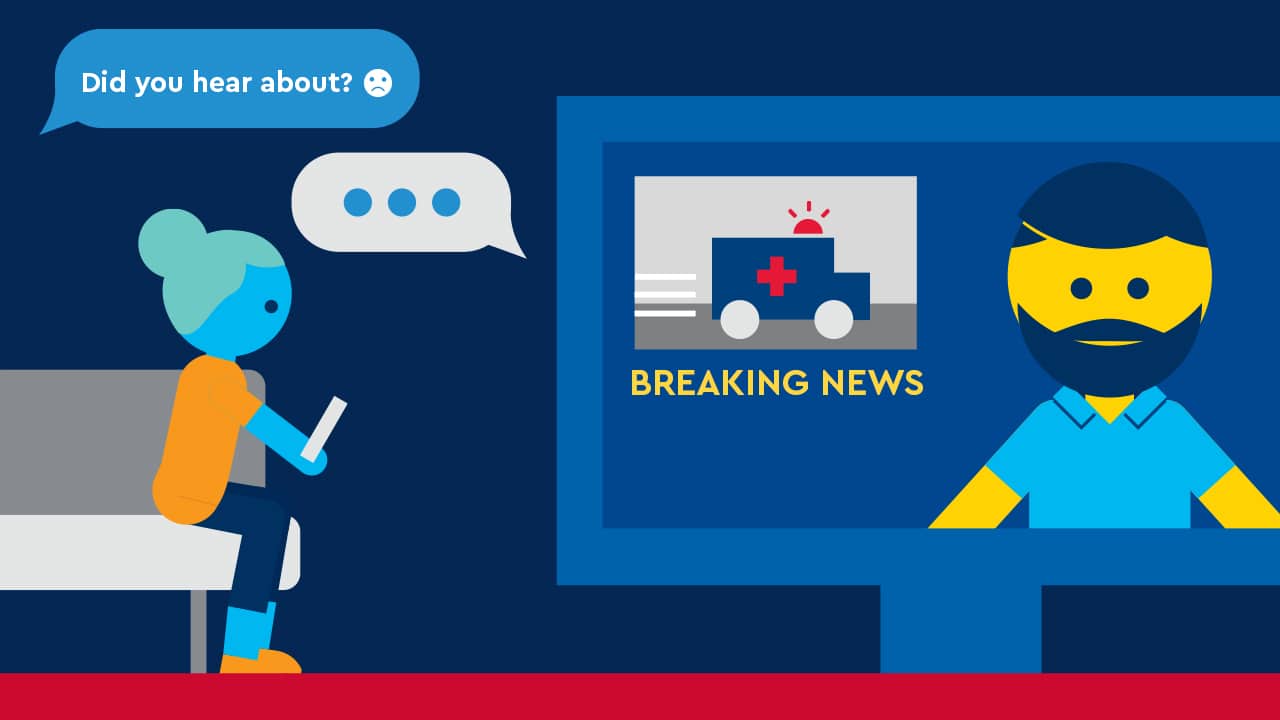Unfortunately, parents across the country found themselves faced with another mass school shooting and the many questions that come from their children after these events happen. By now, you may have a plan in place when discussing tragic events, but if you don't, our partners at Children's Hospital Colorado can help.
After disturbing incidents like shootings, terrorist attacks, riots and natural disasters, feelings of panic and fear increase. Extensive news coverage and posts on social media can heighten those feelings, especially in kids and teens. As adults grapple with how to move forward in the aftermath these events, it's important to help kids and teens process them, too.
“It’s normal for us as parents to want to shield our children from the anxiety that these types of events can cause,” says pediatric psychologist Jenna Glover, PhD. “But even from a young age, our kids are already aware that things are happening, so it’s helpful to talk with them directly about what’s going on.”
General guidelines to help your child cope
When something unsettling is in the news, kids seek security. In general, parents should consider the following:
- Increase how and when you’re available to your child, both physically and emotionally. Being accessible can create a safe space for your child to express their emotions.
- Decrease or set limits on access to media. Young children have trouble processing what they see on the news. And teens, like adults, may at times feel overwhelmed with coverage they see on TV and social media.
- Display and promote stability. If you’re anxious, your child is likely to be more anxious, too. Talking about the event calmly and keeping your child’s routine as normal as possible helps them feel safe.
- Be open to your child’s fears. Younger children may use play to communicate and process their fears. Older kids may simply need to talk about their fears, and you should give them plenty of space to do so.
- Avoid minimizing or jumping to problem solving. Instead, validate your child’s feelings by acknowledging that it’s OK for them to feel whatever they are feeling.
- Be prepared for questions. It’s OK to not have all the answers but do your best to explain the event in terms your child can understand and assure them that they are safe.
Tips by age group
Conversations about what’s in the news will likely be different depending on a child’s age. It is important to have the conversations, though, and to be honest, says Dr. Glover, even with preschool and elementary school children. Here’s how to approach the topic depending on your child’s age.
Kids 10 and younger
How to start the conversation with kids
Especially in the wake of a notable event, parents should be accessible physically and emotionally. Reassure your child that they are safe. Listen to why they’re anxious and discuss it with them.
Dr. Glover recommends starting with these questions:
- What are you seeing?
- How are you feeling about what you’re seeing?
- What questions do you have?
After a crisis, kids are often most afraid of the unknown. They wonder if the event will happen again and if they’ll feel afraid again. Kids need to tell their story, so parents should give them plenty of time and space to do so. It is natural for younger children to play out their fears, and parents should play and interact with them to better understand their concerns.
Limiting news coverage
“Kids are always tuned in,” says Dr. Glover. “Even when you think they’re playing in the background while you’re watching the news, they can pick up on what you’re watching.”
Depending on their age and critical thinking ability, some kids may not understand the process behind a story they see on the news. When they see video footage multiple times, it may be difficult to understand that it’s the same event. Parents should monitor the amount of news their young child is exposed to and be intentional about it. If you let them watch, explain to them what they’re watching and ask them about how it makes them feel and if they have questions.
Preteens and teens
How to start the conversation with adolescents
With adolescents, talks can become more in-depth and conversational. “Having a back and forth with your teen about what they’re thinking and feeling can help them begin to process in a healthy way,” says Dr. Glover.
Parents might ask and give their child space to talk openly about the following:
- There’s a lot going on. What headspace are you in right now?
- What are you seeing on social media?
- Have you posted anything?
- What are your friends posting?
- What do you agree and disagree with?
- What are your reactions?
Limiting social media and news coverage
For preteens and teens, watching too much news coverage on TV and scrolling past it on social media can be stressful and traumatizing. Even if your child wants to stay informed, help them think about the quality and quantity of their consumption. Encourage them to set their own limits and boundaries on how much they consume. Be sure to take your own advice, too. Regulating your intake of news coverage may help you more calmly talk with your child about what’s happening.
Ask your teen questions like:
- Is time on your phone this week making you feel better or worse?
- What sites do you want to visit less this week?
- Do you feel like you’re taking breaks from your phone?
- What do you do when you feel overwhelmed?
- How can we help you feel less overwhelmed?
Considerations for kids and teens of all ages
Of course, there’s no one-size-fits-all approach to how to support your child and family through a distressing event in the media. We’ve provided additional considerations for when current events are multi-layered, nuanced, politically charged or violent. Read more...
